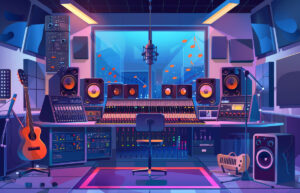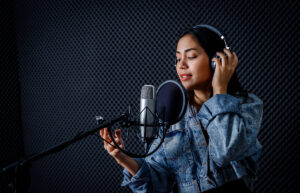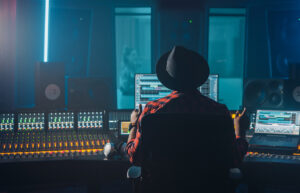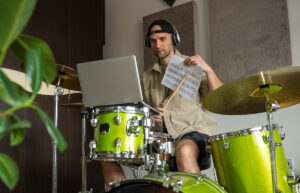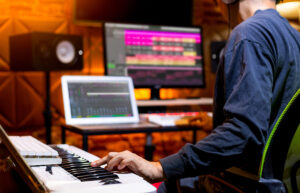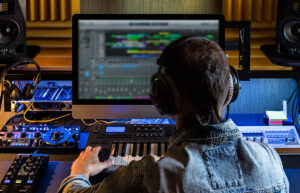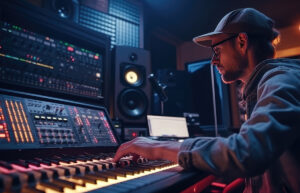How To Become a Music Producer: Tips for Beginners

Ready to turn your passion for music into a thriving career? Becoming a music producer is an exciting journey filled with creativity and opportunity.
But where to start from? We’ll help you out and answer your queries regarding how to become a music producer.
This comprehensive guide is specifically designed for novices, offering practical and relevant tips and essential advice to steer you in the right direction. From setting up your own home studio to mastering the basics of recording, we’ve got all the bases covered. Let’s unlock your potential and unleash your musical talents.
Welcome to TheDemoStop, now join the community!
Connect with artists, fans and producers around the world.
What Is a Music Producer?
On a journey how to become a music producer, it’s important to know who is a music producer. A music producer is the visionary behind a recording project, and is responsible for bringing the artist’s vision to life. They manage the entire process, from songwriting and arrangement to mixing and mastering, ensuring the final product meets the highest standards.
Music producers play a crucial role in recording, polishing, and distributing music. They often wear multiple hats, sometimes doubling as the artist or taking on various specialized roles. For instance, a beat producer focuses on crafting the instrumental backbone for genres like R&B and hip-hop, while a mixing engineer specializes in blending and balancing individual tracks to create a cohesive sound. On a broader scale, an executive producer oversees the entire production process, ensuring all elements come together seamlessly.
The impact of a music producer can be profound, as seen in the work of industry legends like Steve Levine, Mark Ronson, and Rick Rubin. These producers have shaped the sound and success of countless artists, demonstrating the pivotal role producers play in the music industry.
What Skills Does a Music Producer Need?
To learn how to become a music producer, you need to learn certain skills. As a producer, these skills will help you master and create successful sound recordings and albums, ensuring their work stands out in the competitive music industry.
- Understanding of Music Theory: Producers need a solid grasp of how different musical elements fit together and how to make them sound harmonious.
- Technical Knowledge: Mastery of sound engineering and proficiency with digital audio workstations (DAWs) are vital for manipulating and perfecting sound.
- Creativity: The ability to find inspiration and persevere through setbacks is crucial for producing innovative and high-quality music.
- Strong Listening Skills: Discerning different instruments, notes, and chords, and understanding which sounds complement each other are fundamental to creating a polished track.
- Project Management Skills: Being organized, delegating tasks effectively, inspiring teamwork, and keeping projects within budget are essential for managing the production process.
- Attention to Detail: Ensuring precision to avoid errors and maintain efficiency is key to producing high-quality work.
- Focus and Ambition: Maintaining high standards and persevering through challenges are important for long-term success.
- Patience: Navigating the slow path to success and working effectively with various collaborators like sound engineers, artists, and songwriters requires a great deal of patience.
How To Become a Music Producer?
Build a Basic Home Studio
The evolution of digital music equipment and online DAWs (Digital Audio Workstations) has revolutionized the music production process, making it more accessible and convenient than ever before. For those serious about pursuing a professional music career, establishing a proper workspace is crucial. Fortunately, building a home studio doesn’t have to be expensive and offers the benefit of 24/7 access.
To get started, you’ll need a few essentials: a computer, DAW software, an audio interface, and quality headphones or studio monitors. These basics are enough to begin creating tracks. As you refine your workflow, consider enhancing your setup with additional gear such as a MIDI controller, a microphone, and various software plugins or samples. If space is an issue, explore options like renting recording spaces or sharing a studio with other musicians.
Learn an Instrument
Welcome to TheDemoStop, now join the community!
Connect with artists, fans and producers around the world.
One of the most crucial tasks for music producers is creating compelling melodies. Learning to play an instrument can significantly bolster your musical command. Today, many producers use digital synthesizers connected to their laptops, enabling them to experiment with different chords and discover new melodies and beats to track and edit on their computers.
Investing time in learning basic music theory and applying it to your instrument will greatly enhance your ability to produce music and contribute to your future success.
Practice Writing Music
To become a successful music producer, mastering songwriting is essential. It’s the backbone of understanding how instruments blend, how song structures form, and how hits emerge.
Focus on three key areas: chord progressions, song structure, and lyric writing.
- Chord Progressions: These are the foundation of your song, dictating its mood and melody. Start by learning basic progressions and how they can evoke different emotions. Experiment with variations to find what best suits your style.
- Song Structure: Familiarize yourself with standard structures, such as verse-chorus-verse, and understand how to build tension and release to keep the listener engaged.
- Lyric Writing: Lyrics convey relatable messages and emotions. Start with simple themes and gradually advance to more complex topics. Focus on crafting lyrics that resonate with your audience, telling a story or expressing an emotion that people can connect with.
Begin with the basics and advance gradually. Explore tutorials for chord progressions, adhere to standard song structures, and craft lyrics that resonate with your audience. Practice consistently, refining each element, to become a proficient music producer.
Decide on Music Equipment
To become a successful music producer, choosing the right equipment is crucial. While professionals often use a variety of tools, starting with the essentials is key. Begin with a computer, a keyboard synthesizer with a USB connection, and an audio interface with a microphone. These basics will facilitate beat creation, melody development, and vocal recording.
Remember, your equipment will evolve with your journey; as your earnings grow, you can enhance your setup. However, always prioritize creativity and persistence over gear because it’s not about the tools; it’s about the magic you create with them.
Learn How To Use a DAW
To become a music producer, mastering your Digital Audio Workstation (DAW) is essential. Your DAW is where you bring your musical ideas to life—it’s your creative hub for recording, editing, and arranging tracks. Think of it as your musical canvas where you can experiment, refine, and finalize your compositions.
Most producers use their DAW for songwriting as well, leveraging its capabilities for fluid brainstorming and refining of musical ideas. Choosing the right DAW is crucial, but all major DAWs (such as Ableton Live, Logic Pro, FL Studio, etc.) share similar core functions. But remember, learning the basics early on sets a solid foundation for your journey in how to become a music producer.
Train Your Ear
An adept music producer must be able to discern and differentiate between various sounds and instruments is paramount. This skill, known as ear training, involves actively listening to songs and identifying individual components such as drums, basslines, melodies, and harmonies. Paying attention to mixing characteristics, like vocal EQ, reverb, and bassline prominence, offers insights into production techniques.
Ear training bridges music theory with practical application, enabling you to recognize intervals, chords, scales, and notes by ear rather than relying solely on sheet music.
Master Recording Basics
Mastering recording basics is essential to becoming a proficient music producer. Even in the digital age of DAWs, these foundational techniques remain crucial.
Multitrack recording involves layering instruments sequentially to craft a song, while overdubbing allows for enriching sound textures by recording over existing tracks.
Meanwhile, audio editing polishes performances to achieve optimal quality. With practice, you can integrate these techniques seamlessly into your production workflow, enhancing your abilities as a music producer.
Find or Create Sounds To Use
Welcome to TheDemoStop, now join the community!
Connect with artists, fans and producers around the world.
Whether you are recording live with microphones, using virtual instruments, or sampling, having access to quality sounds is key. While some DAWs offer built-in plugins and content libraries, many producers prefer to curate their collections for a unique sound.
Fortunately, there are numerous free plugins available to experiment with, though transitioning to professional software is advisable as you progress. Keep in mind that some plugin types may require paid access, and when using samples, ensure they’re royalty-free, especially if you plan to monetize your music.
Mix Your Songs
Mixing your songs is about achieving clarity and balance among all your sound elements. Despite its perceived complexity, mastering the basic techniques can simplify the process. Using a DAW mixer, you adjust levels and stereo positioning, sculpt the frequency balance with EQ, manage dynamics using compression, and enhance spatial depth with reverb and other effects.
While each technique has its nuances, becoming proficient in them is highly rewarding. However, mixing is not the final step—mastering adds the final polish before release. While some musicians opt for DIY mastering, it can be technically challenging and risky. On the other hand, many opt to entrust mastering to professionals to ensure the highest quality for their tracks.
Remember, you don’t need an expensive studio for a great master. So, as you mix your songs, take it slow, learn, and seek help when needed.
Grow Your Network of Collaborators
To succeed as a music producer, expanding your network of collaborators is vital. While some work alone, collaboration is key. Beatmakers often team with topline singers for catchy hooks. Major releases need diverse talents. Build a strong network to broaden creativity and enhance your productions. Reach out, collaborate, and see your music career thrive through shared creativity.
Conclusion
What is a music producer?
A music producer is the visionary behind a recording project and is responsible for bringing the artist’s vision to life.
What skills does a music producer need?
- Understanding of Music Theory
- Technical Knowledge
- Creativity
- Strong Listening Skills
- Project Management Skills
- Attention to Detail
- Focus and Ambition
- Patience
How to become a music producer?
- Build a basic home studio
- Learn an instrument
- Practice writing music
- Decide on music equipment
- Learn how to use a DAW
- Train your ear
- Master recording basics
- Find or create sounds to use
- Mix your songs
- Grow your network of collaborators
FAQs
How do music producers start their careers?
Music producers typically start by building their skills in music production, often through self-study, formal education, or mentorship. They create their own music or collaborate with other artists to gain experience and exposure in the industry.
What skills does a music producer need?
- Understanding of Music Theory
- Technical Knowledge
- Creativity
- Strong Listening Skills
- Project Management Skills
- Attention to Detail
- Focus and Ambition
- Patience
How many years of college do you need to be a music producer?
Typically, pursuing a Bachelor’s Degree in Music Production, which lasts around four years, is considered a worthwhile path for aspiring music producers. However, the duration can vary based on individual goals, educational background, and the specific program chosen.
How long does it take to learn to be a music producer?
Typically, it takes around 4 to 6 years of dedicated work in music production before you begin collaborating with renowned music labels and generating additional income from your music.
How much does it cost to get a song produced?
On average, producing a song can cost anywhere in the range of $500 to $5000.








